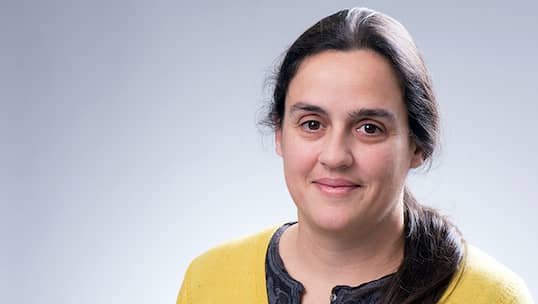28.06
2021
Interview with Dr. Caroline Arber, haematologist at UNIL, CHUV and the Ludwig Cancer Research
Interview with Dr. Caroline Arber, haematologist at UNIL, CHUV and the Ludwig Cancer Research
Could you give us a brief overview of the blood system?
The blood is a vital organ of the human body. Cells in the blood have very important functions such as transporting and delivering oxygen to tissues, defending us against infections, helping to form blood clots, and many more.
My favourite cells in the blood are those of the immune system – in particular the T-lymphocytes that can recognise very specific antigens on foreign cells. They defend the body very specifically against pathogens, and under certain circumstances can also recognise cancer cells.
What is your research in haematology about? And what led you to this topic?
As a haematologist, I focus on the development of novel types of adoptive T-cell therapies that specifically target blood cancers. In my laboratory, in the Department of Oncology at UNIL, CHUV and the Ludwig Lausanne Branch, we modify T-cells so that they can recognise and kill blood cancer cells. Most of our research is currently at the preclinical development stage, but we have plans to take some of our approaches to clinical trials in the near future.
I chose to move into the field of engineered T-cell therapies about 10 years ago. I realised that cellular therapies were quite unspecific at the time, with rather low success rates. We now have the opportunity to redirect immune cells much more specifically to selected cancer antigens, in more efficient ways and with fewer side effects.
What clinical impact could your research have?
Our main goal is to develop novel immunotherapies that can be implemented into early-phase clinical trials. If one of our therapies is successful, we may see significant clinical impact in the treatment of blood cancers in the future, along with better outcomes for blood cancer patients.
Which innovation would you like to see in immunotherapy?
I would love to see engineered T-cell therapies going off the shelf. Currently, each cell therapy product is manufactured for each patient individually, which is a big challenge for clinicians, patients and manufacturers. If we had a cell product for a specific cancer stocked on site and available on demand for many patients, that would be a big step forward in the field.
Biography
Caroline Arber received her Doctor of Medicine from the University of Basel, Switzerland, in 2000. After a research fellowship at Stanford University (2001-2003), she completed clinical specialization with FMH titles in both Internal Medicine and Hematology in Switzerland. Focusing on stem cell transplant and cellular therapies, she was attracted into the T cell engineering field and moved to Baylor College of Medicine, USA. After a postdoctoral fellowship from 2010-2013, she started her independent research as Assistant Professor in 2014. In 2017, she was recruited to the Department of oncology UNIL CHUV and the Ludwig Lausanne Branch to build a translational research program of targeted T cell therapies for hematologic malignancies. At CHUV, she leads the CAR T clinic for hematologic indications. Dr. Arber is the recipient of several awards, including an American Society of Hematology Scholar Award (2013), a Leukemia and Lymphoma Society Translational Research Program Award (2015), a Team Science Recognition Award by the Society for Immunotherapy of Cancer (2020) to the Lausanne Branch of the Ludwig Institute for Cancer Research, and in collaboration with Profs. Elisa Oricchio and Bruno Correia (EPFL), a Translational Biomedical Research Award by the Fondation Leenaards (2021).
